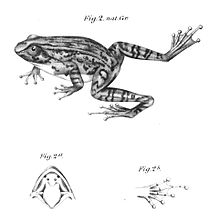Petropedetidae
| Petropedetidae | |
|---|---|

| |
| Petropedetes cameronensis | |
| Scientific classification | |
| Domain: | Eukaryota |
| Kingdom: | Animalia |
| Phylum: | Chordata |
| Class: | Amphibia |
| Order: | Anura |
| Clade: | Ranoidea |
| Family: | Petropedetidae Noble, 1931 |
| Type genus | |
| Petropedetes Reichenow, 1874
| |
| Synonyms | |
|
Petropedetinae | |
The Petropedetidae are a family of frogs containing three genera and 12 species.[1][2] They are found in sub-Saharan tropical Africa[1] and are sometimes known under common name African torrent frogs.[3]
They are inhabitants of the splash-water zone of clear-running streams predominantly in forests. Tadpoles are either semiterrestrial in the spray zone or fully aquatic in zones of the strongest currents. Some species guard their clutches.[3] They are small (Ericabatrachus)[4] or medium- to large-sized frogs (Arthroleptides and Petropedetes).[3]
Taxonomy
The Petropedetidae are related to true frogs, family Ranidae, and have often been considered as a subfamily within a broadly defined Ranidae.[5] However, they are now commonly treated as a family,[1][2][5][6] although the genera included may differ between sources. In particular, Conraua is sometimes included in the Petropedetidae,[6] instead of forming its own monogeneric family Conrauidae.[1][2][6]
| Domain | Eukaryota |
| Kingdom | Animalia |
| Phylum | Chordata |
| Class | Amphibia |
| Order | Anura |
| Clade | Ranoidea |
| Family | Petropedetidae |
Genera
The three genera in the family are:[1][2]
- Arthroleptides Nieden, 1911 – African torrent frogs, three species
- Ericabatrachus Largen, 1991 – Bale Mountains frogs, one species
- Petropedetes Reichenow, 1874 – African water frogs, nine species
Recognition of Arthroleptides as a genus separate from Petropedetes is relatively recent.[3][7]
Description
Habitat and Distribution
Diet and Behavior
References
- ^ a b c d e Frost, Darrel R. (2014). "Petropedetidae Noble, 1931". Amphibian Species of the World: an Online Reference. Version 6.0. American Museum of Natural History. Retrieved 29 May 2014.
- ^ a b c d "Petropedetidae". AmphibiaWeb: Information on amphibian biology and conservation. [web application]. Berkeley, California: AmphibiaWeb. 2014. Retrieved 29 May 2014.
- ^ a b c d Barej, M. F.; Rödel, M. O.; Loader, S. P.; Menegon, M.; Gonwouo, N. L.; Penner, J.; Gvoždík, V. C.; Günther, R.; Bell, R. C.; Nagel, P.; Schmitz, A. (2014). "Light shines through the spindrift – Phylogeny of African torrent frogs (Amphibia, Anura, Petropedetidae)". Molecular Phylogenetics and Evolution. 71: 261–73. doi:10.1016/j.ympev.2013.11.001. PMID 24239613.
- ^ Largen, M. J. (1991). "A new genus and species of petropedetine frog (Amphibia Anura Ranidae) from high altitude in the mountains of Ethiopia". Tropical Zoology. 4: 139–152. doi:10.1080/03946975.1991.10539483.
- ^ a b Blackburn, D.C.; Wake, D.B. (2011). "Class Amphibia Gray, 1825. In: Zhang, Z.-Q. (Ed.) Animal biodiversity: An outline of higher-level classification and survey of taxonomic richness" (PDF). Zootaxa. 3148: 39–55. doi:10.11646/zootaxa.3148.1.8.
- ^ a b c Vitt, Laurie J.; Caldwell, Janalee P. (2014). Herpetology: An Introductory Biology of Amphibians and Reptiles (4th ed.). Academic Press. p. 507.
- ^ Frost, Darrel R. (2014). "Arthroleptides Nieden, 1911 "1910"". Amphibian Species of the World: an Online Reference. Version 6.0. American Museum of Natural History. Retrieved 29 May 2014.
